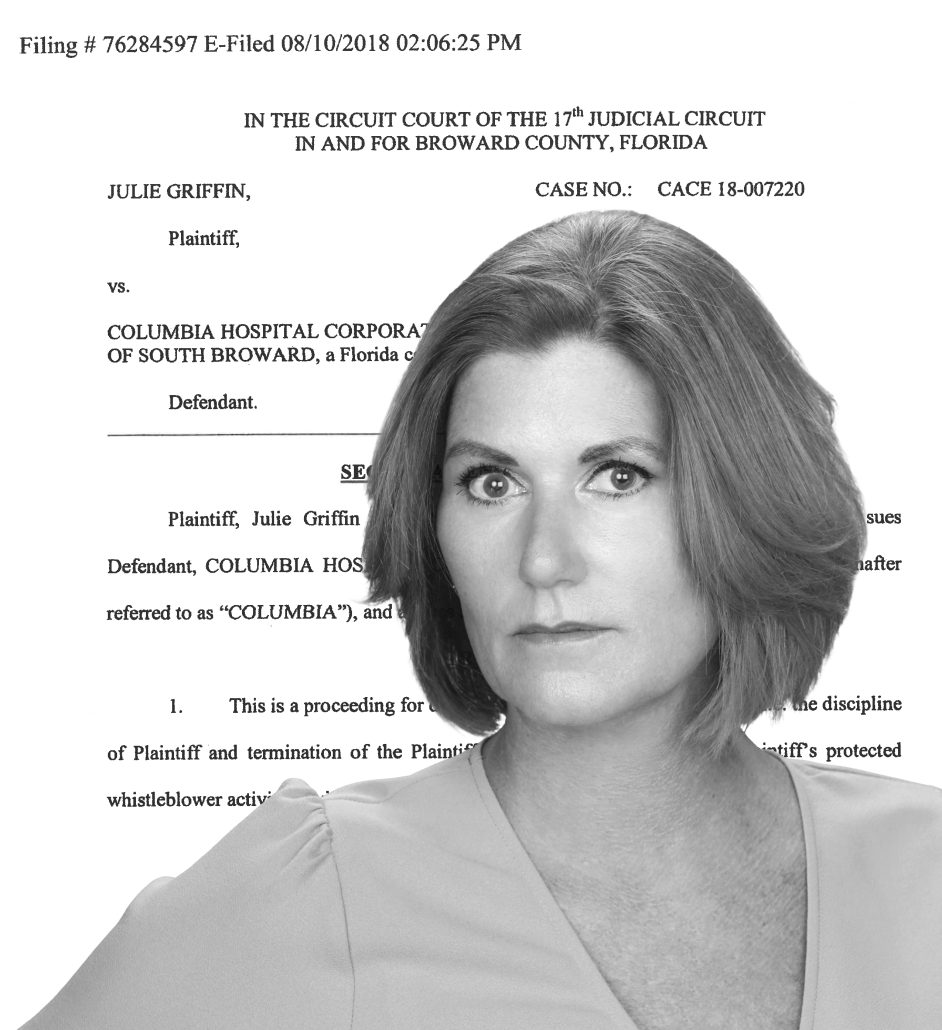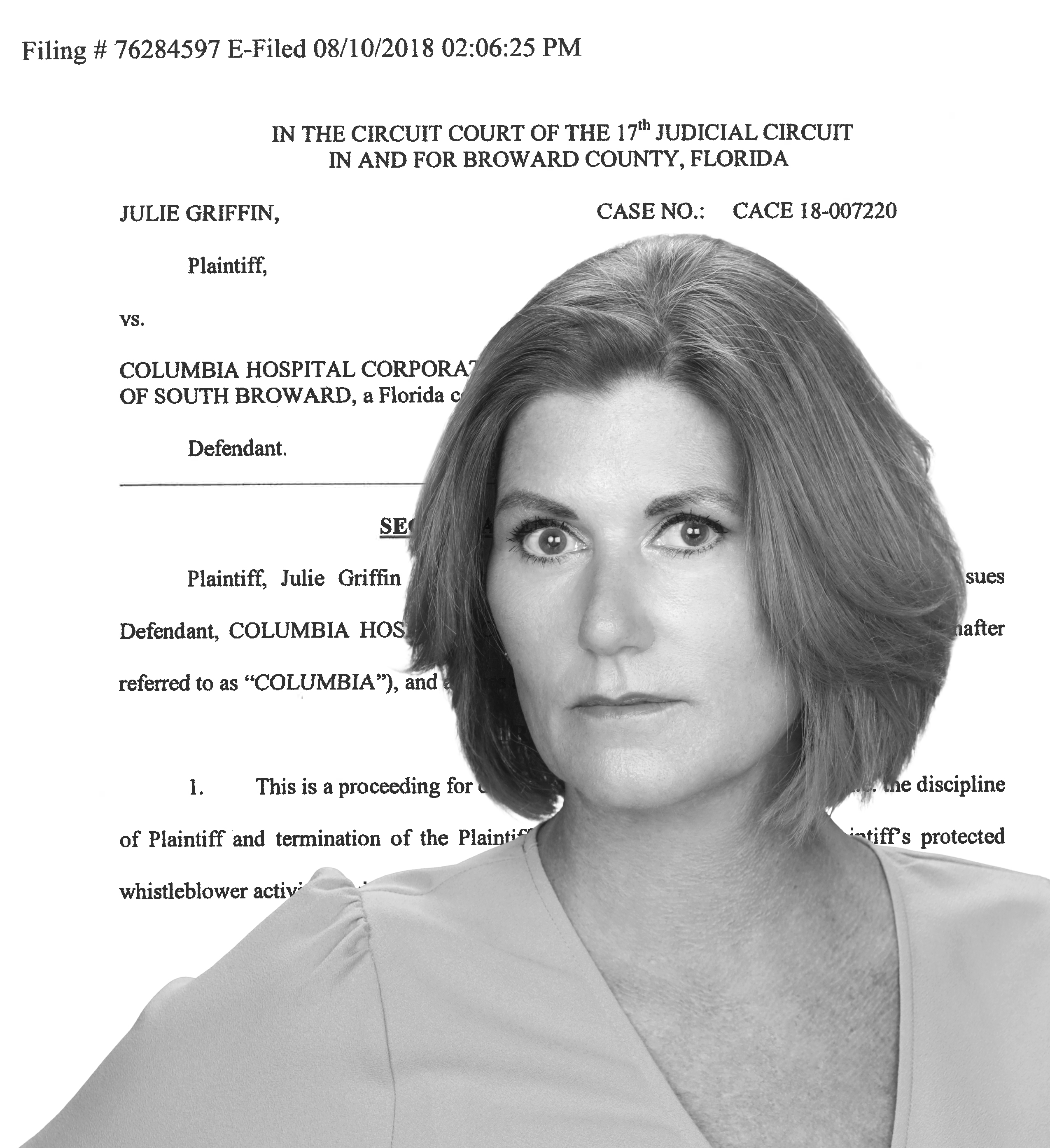Nurse Julie Griffin Photo by Munoz Photography
Bob Aller
Nurse Julie Griffin worked as an RN at the Westside Regional Medical Center in Plantation, Florida (Miami metro area). Repeatedly, Ms. Griffin registered criticism with hospital administrators over the practice of no continuous monitoring as well as inadequate nurse staffing on her cardiovascular ICU. Nurse Griffin believed it was her professional responsibility to safeguard all her patients. For her actions, Nurse Griffin was terminated.
Ms. Griffin filed a Florida Whistle-Blower Act lawsuit in Broward County, Florida. A Second Amended Complaint filed on August 10, 2018, alleges she was retaliated against and fired for making whistle-blower complaints.
Lawsuit Alleges Violations of State & Federal Law & Regulations
 The suit alleges that failing to continuously monitor elderly cardiac patients constituted “neglect of an elderly person or disabled adult under Florida law.” In addition, the suit indicates that the hospital required Ms. Griffin to sign an electronic medical record claiming cardiac patients were continuously monitored when the hospital knew that was not true. The suit asserts that the falsification of medical records was done to receive federal funds in violation of Federal law. Finally, the suit contends that the hospital received Medicare payments when it failed to meet a “minimum nurse-patient ratio of one nurse to two patients” that must be obtained under Federal regulations.
The suit alleges that failing to continuously monitor elderly cardiac patients constituted “neglect of an elderly person or disabled adult under Florida law.” In addition, the suit indicates that the hospital required Ms. Griffin to sign an electronic medical record claiming cardiac patients were continuously monitored when the hospital knew that was not true. The suit asserts that the falsification of medical records was done to receive federal funds in violation of Federal law. Finally, the suit contends that the hospital received Medicare payments when it failed to meet a “minimum nurse-patient ratio of one nurse to two patients” that must be obtained under Federal regulations.
[googlepdf url=”https://hospitalwatchd.wpengine.com/wp-content/uploads/Juliegriffincomplaint-1.pdf” download=”Download” ]
Interview With Nurse Griffin
Hospital Watchdog interviewed Ms. Griffin to learn the details of the events outlined in her lawsuit. Nurse Griffin summarized the key issues involving no continuous monitoring for some cardiac patients on her CVICU.
- When cardiac patients were admitted to the CVICU unit there was a standing order for continuous monitoring for these patients.
- However, nurses could only monitor two (2) patients since the nurses’ telemetry screens only provided split-screen data for two patients in each of the patient’s separate rooms.
- Frequently, the hospital required nurses to care for three (3) cardiac patients simultaneously. Assigning a third patient created an acute problem. For the third cardiac patient, no continuous monitoring could occur due to the technical limitation of the split-screen that only serves two patients.
- In addition, as a back-up, the hospital did not provide full-time staff at the CVICU nurse’s station to monitor telemetry for all CVICU patients. Consequently, no staff could notify nurses if their unmonitored 3rd cardiac patient took a turn for the worse.
- At least two of these unmonitored patients died.
CMS Rated Westside In the Lowest 6% Of U.S. Hospitals

While reviewing the history of Westside Regional, Hospital Watchdog found that CMS most recently rated Westside in the lowest 6% of CMS rated U.S. hospitals. Westside received a 1 Star rating on Hospital Compare, a federal consumer-oriented website providing information on how well hospitals perform. Yelp reviews appear consistent with the poor CMS hospital rating received by Western Regional.
To obtain answers to key questions, Hospital Watchdog requested an interview with a Westside hospital representative. However, the hospital public affairs staff did not respond to three written requests for comments.
Q & A With Nurse Griffin
In an interview, Nurse Griffin discussed her experience at Westside. To verify her claims, Ms. Griffin provided supporting documentation. (This interview was edited for clarity and brevity.)
What Were The Troubling Conditions You Encountered?
Q: What was your reaction when you were told to accept a third ICU patient?
A: When I was assigned a third patient there was no continuous monitoring. Consequently, I had no idea if my patient was doing well or poorly. If the patient had an adverse medical event, I wouldn’t know. That had me worried that one of my patients might die because I was unable to monitor them. I knew that my ethical responsibilities to the patient couldn’t be met. Finally, I asked myself would I accept this practice if a family member on an ICU was not monitored? The answer was a resounding NO. Still, I wanted to keep my job so I did what others did, I accepted three patients as required in my unit. At first, I wasn’t able to speak up.
Q: Were other nurses on your unit bothered by the requirement to accept three patients?
A: For sure. We were a close-knit nursing group in a 12-bed unit. We talked about it often. It bothered every one of us. But the nurses were understandably afraid to speak up because, if I guess correctly, they were looking at retirement or they had young children, or they were the main breadwinner. We were all quite aware of the serious risks for speaking up. I didn’t say anything for quite a while.
Q: Were there other issues?
A: We were often given 3 and on occasion even 4 patients. I saw nurses with no ICU training placed on the unit. I even observed nurses on our unit who were not trained to treat a recovering open-heart patient. I heard physicians comment that the unit was not safe. One doctor referred to the hospital as “Deathside” (instead of Westside).
Q: Did the CVICU ever provide full-time monitoring at the nurses’ station?

A: Occasionally a charge nurse would sit at the nurses’ station checking all the patient telemetry. But the charge nurse had multiple duties and would only be there for a limited time. Sometimes the charge nurse might go to a meeting or transfer a patient or go outside the unit. With no backup for monitoring, we all had to rely on our own individual monitoring.
Patients Died While Unmonitored
Q: Could you describe the death of one of the unmonitored patients?

A: Here’s what I remember. A man came out to the nurse’s station and said something was wrong with his family member. At that time the family member’s nurse was actively involved in another room with another patient and the nurse couldn’t break away and check the family member face to face. The telemetry was not available for this patient since our screens could only provide the data for two patients. If the nurse had been able to monitor the patient’s vitals there might have been signs that would have alerted the nurse to rush to the patient or to get help. The nurse’s third patient might have been saved. Instead, it turned out the patient may have been dead for about 30 minutes before the death was even discovered.
Q: What do you recall about a 2nd patient who died with no continuous monitoring?

A: There was a patient on our unit who died from a pulmonary condition, according to a doctor’s best guess at the time. As I explained, we only had the ability to monitor two patients on a split-screen. The patient’s nurse couldn’t see what was going on with the third patient with vitals and other measurements. If the nurse had been able to observe this patient’s vitals, the nurse might have seen irregularities developing. There could have been rapid breathing, rapid heart rate, chest pain, shortness of breath, coughing, low blood pressure, fever. Unfortunately, the nurse couldn’t monitor the third patient and, in my view, the patient died without receiving the intensive care that we should have provided.
Comment: The two case examples provided by Nurse Griffin are not substantiated with medical records or other documentation. However, there are CMS Statement of Deficiency reports describing circumstances where ICU nurses were unaware of their patients deteriorating vitals due to a lack of proper monitoring. Such cases demonstrate how quickly a fatality can occur on an ICU. (See a summary of Adventist Bakersfield patient death) (See CMS Statement of Deficiency Report Adventist Bakersfield Hospital)
Nurse Griffin Thought Everything Would Be Corrected
Q: Once you started complaining, what result did you expect?
A: I literally thought the problem of no continuous monitoring would be corrected. When I was in the Navy, I learned to go up the chain of command. That’s what I did at Westside and I believed that the hospital would take care of the problems. I thought maybe this is just a local thing, maybe the people up at the top, maybe they don’t know. And that’s why I went to corporate. But that showed me I was naïve. I believe this policy came from the top.
Threatening Incident With Unit Director
Q: Could you fill in details on the threatening incident you described in your lawsuit?
A: I’ll never forget that day. I had been harassed in various ways for months. On this day it was probably around five o’clock in the afternoon. The unit director, Dexter Dore, came in holding my coffee cup. We had a policy of no food or drink allowed at the nursing station. My coffee cup had been in the break room the entire day. I told him the cup was clean and empty and sitting by my things for when it was time to go. He repeated, “yeh, clean and empty.” He held it over the garbage can.

I asked him, “Please, do not throw my personal belongings into the garbage.” Right in front of me, he dropped it into the garbage can as he said: “You know the rules.” I said, “You have no right to throw my personal belongs away.” I stepped forward and picked my cup out.
He approached me with his index finger coming within inches of my face, intimidating me. He stated, “No cups allowed.” He snapped his fingers inches from my face and said, “Get to my office.” I backed up. I said, “I’m feeling very threatened right now. You need to back away from me.” Then I went to the computer to fill out an incident report.
I was still writing the incident report when he came back with the nursing supervisor. He had only been in his position for a few months and I didn’t really know him or what he might do to me. I was frightened.
I put my cell phone up on the computer to record what would happen and the nursing supervisor saw it and said to the Director: “Don’t say anything else. She’s recording.”
They both left.
911 Call To Local Police
I finished my incident report and submitted it online. I then gave the charge nurse my patient reports so I could be relieved. I then called 911. I was genuinely afraid. Police officers arrived promptly. I was escorted to my car. That was February 22, 2017.
Westside HR Acknowledged Director’s Actions Were Inappropriate
After my incident report was reviewed by HR, I met with two HR staffers. They acknowledged that the Director’s actions with the coffee cup were inappropriate. Even so, after that meeting, when he walked past me the Director would growl and grunt, making noises to annoy me. I assumed he was trying to get me to quit.
Florida House Member, Barbara Watson, Campaigns For A New Bill: “Florida Hospital Patient Protection Act” (HB231)
During the same period when Nurse Griffin was harassed while advocating for patient safety at Westside Regional, Florida House member Barbara Watson was attempting to advance a bill that addressed some of the same issues. (More details on Florida Hospital Patient Protection Act.)
View a draft of the Florida Hospital Patient Protection Act.
Nurse Griffin’s Termination
Four months after the threatening incident, on the morning of May 24, 2017, Nurse Griffin sent an email to her unit’s Director Dexter Dore. Among other issues, she described her caseload at that time: “… I have been assigned 2 patients. 1 has a transfer order. While it may look as though the care I am providing would allow for an additional assignment, I believe that it would be unsafe. The patient in room 18 is a post-open-heart patient receiving diuretics and needing to get up to the toilet frequently. Without my answering her call light when she rings she may urinate on herself or attempt to get up on her own and fall with all the cables attached to her. My other patient, as you heard in rounds this morning, constantly screams for help.”
Director Arrives On Unit, Nurse Griffin Required To Accept Three Patients
Later that same day, around 5 PM, Mr. Dore came to the unit. Ms. Griffin was instructed to take a third patient. Again, she refused. Another nurse said she needed to take 1 hour to arrange to have her second patient moved to a step-down unit. After that arrangement was concluded the other nurse said she could take the patient that Ms. Griffin was ordered to accept as her third patient.
The unit’s Director said that since Ms. Griffin was on a list she was required to take a third patient (even though the other nurse would have only 1 patient).
The hospital moved quickly. Julie Griffin was immediately put on administrative leave. Two weeks later she was terminated.
The Bottom Line
Q: What’s your take-home message for nurses?
A: It’s simple. When you’re a patient in an intensive care unit, you should receive intensive care. Every moment should be monitored. If patients aren’t monitored, medical complications will surface. More deaths will occur. It could happen to your mother or my mother. As an RN on an ICU, I have the professional responsibility to safeguard all my patients. That’s what I did.
After Firing Nurse Griffin Westside Regional Now Continuously Monitors All CVICU Patients
Hospital Watchdog has been informed by another nurse from Westside Regional that after Nurse Griffin was fired the hospital changed its policy and now continuously monitors all patients in the CVICU. Though Nurse Griffin was fired, it appears her advocacy had a significant impact. Based on the information provided to us, if a problem arises with any patient, an alert appears on all monitoring screens on the unit. In this way, all nurses are immediately made aware of the problem. (This new policy could not be verified with Westside Regional since the hospital refused to answer any questions.)
Westside ER Nurse Now Reports Troubling Conditions At The Westside ER
A nurse working in the Westside Regional ER has reported to Hospital Watchdog being assigned three high acuity patients (needing a high level of care). These patients were scheduled to be transferred to an ICU as soon as beds were available.
All three patients were suffering from major health crises. One of the patients had just had a heart attack and one of the patients was also suffering from respiratory distress. Due to severe conditions, all three patients were continuously monitored in the ER. However, nurses at the Westside ER can only observe the monitoring screen when the nurse is in the room of that patient.
The ER nurse described what the nurse believes is a troubling and dangerous problem in the Westside ER. There is no dedicated monitor tech at the nurse’s station. Consequently, there is no assigned staff to alert a nurse if their patient in another room has a change in vital signs/cardiac rhythm requiring immediate attention. Thus, ER nurses may not be notified if one of their patients is at perilous risk.
Westside Regional Medical Center is not just a local community hospital. Westside is an HCA Healthcare hospital, the largest for-profit hospital chain in the U.S. It’s reported that HCA owns 185 hospitals. HCA earned nearly 47 billion in 2018. According to HCA, the corporation has 249,000 employees, including 38,000 physicians and 87,000 nurses. At HCA, profit is front and center.

The HCA CEO, Samuel Hazen. has an education in finance and business administration along with years of managerial experience at HCA. Mr. Hazen is apparently accomplished at producing profits. He was paid over $10 million for services during fiscal 2019. Yet, the Chairman of HCA, H. Milton Johnson, was paid over $20 million for his services during fiscal 2019. While HCA is known for its size and profitability in the healthcare industry, HCA is also well-known to state and federal oversight personnel and in legal circles for the criminal and civil litigation levied against the hospital chain. Over the last 20 years, HCA has reportedly paid out close to 2 billion dollars in criminal and civil damages, penalties, fines, settlements, etc. for various fraudulent or illegal schemes. While there is extensive press coverage on these lawsuits and penalties, here is one report. NY Times on HCA False Claims
An obvious question arises: Did profits come ahead of patient safety at Westside?
Going Up The Chain Of Command Can Be A Rough Road
What happened to Nurse Griffin was more than unfortunate. She fought hard. It appears she brought change. Generally, hospital staffs are reluctant to register complaints within their hospitals for fear of retaliation.
There are options. File an anonymous complaint with an oversight entity. The Centers for Medicare and Medicaid, (CMS) provides a page describing how to file a complaint. The Joint Commission has a page with information for filing an anonymous complaint against a hospital. The page is titled: Report a Patient Safety Concern or Event.
(Hospital Watchdog volunteers contributed to this story)
To receive updates on the story here is our sign up form.
[hubspot type=”form” portal=”23786448″ id=”8fe89d96-3dc6-4eba-bfe5-02d524fe82d5″]



